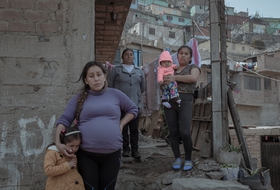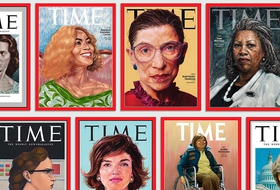
One in three women have suffered physical or sexual violence. With contributions from Europe, Africa, Asia and Latin America, we look at how this shadow pandemic affects every corner of the world.
European Commission President Ursula von der Leyen reminded us of the gravity of violence against women around the world, and of the Istanbul Convention’s utmost importance.
European Commission President Ursula von der Leyen, during a plenary session of the European Parliament on 26th April, spoke about the incident that took place during her visit to Turkey alongside European Council President Charles Michel. When the two arrived at a meeting with Turkish President Recep Tayyip Erdoğan, von der Leyen was left without a chair. She believes this wasn’t an issue of planning or protocol, but a gender issue.
Von der Leyen used the incident to bring light to what happens to women all over the world every day: discrimination, violence, and a lack of equal treatment. Unfortunately, however, too many episodes of violence – psychological or physical – are not reported, so nothing is done about them. For this reason, von der Leyen highlighted the importance of the Istanbul Convention, the Council of Europe treaty to combat and prevent violence against women and domestic violence, which was opened for signature ten years ago, on 11th May 2011.
Given the critical women’s rights situation in certain countries, some of which (like Turkey) have even withdrawn from the Convention, or are thinking of doing so (like Poland). Von der Leyen stated that all European countries’ adhesion to this binding international treaty remains a priority for the Union and that laws will be put forth to expand the list of crimes – like hate crimes – so that any form of violence is prevented, condemned, and prosecuted.
“I am the first woman to be President of the European Commission. I am President of the European Commission, and this is how I expected to be treated when visiting Turkey two weeks ago. Like a Commission President. But I was not. I cannot find any justification for the way I was treated in European treaties, so I have to conclude that it happened because I am a woman. Would this have happened if I had worn a suit or a tie? In the pictures of previous meetings, I did not see any shortage of chairs. Then again, I did not see any women in these pictures either. Honourable members, many of you will have had similar experiences in the past. Especially the female members of this house. I’m sure you know exactly how I felt. I felt hurt and I felt alone, as a woman and as a European.
Because it is not about seating arrangements or protocol. This goes to the core of who we are. This goes to the values our Union stands for. And this shows how far we still have to go before women are treated as equals, always and everywhere. Of course, I know that I am in a privileged position.
I am the President of an institution that is highly respected around the world. And, even more important, as a leader I can stand up and make myself heard. But what about the millions of women who cannot? Women who are hurt every day, in every corner of our planet, but neither have the power nor hold the office to speak up. When I arrived at the meeting, there were cameras in the room. Thanks to them, the short video of my arrival immediately went viral and caused headlines around the world. There was no need for subtitles. There was no need for translations. The images spoke for themselves. But we all know, thousands of similar incidents, most of them far more serious, go unobserved. Nobody ever sees them or hears about them because there is no camera. Because there is nobody paying attention. We have to make sure that these stories are told too, and that when they are told, they are acted upon.
The Istanbul Convention is an important tool for that. In May, it will be ten years since the convention was signed. It is a groundbreaking legal text and an inspiring document. It is the first internationally binding instrument to take a broad approach to combating violence against women and children. The Convention prohibits psychological violence, sexual harassment, stalking, and it outlaws domestic violence.
I do not need to tell you how important this is, especially now, in times of pandemic. I used my meeting in Ankara to reiterate my deep concern about Turkey withdrawing from the Convention. The withdrawal of one of the founding members of the Council of Europe is a terrible signal. To be credible, however, we must not only criticise others. To be credible, we also have to act at home.
You all know that several member states have still not ratified the convention and others are thinking about quitting. This is not acceptable. Any kind of violence against women and children is a crime. We must call it a crime and it must be punished as such. And this is why I want the EU itself to join the Istanbul Convention. This remains a priority for my Commission.
But, as the EU’s accession is stalled in Council, we will, before the end of the year, present alternative measures. We will put forward legislation to prevent and combat violence against women and children, offline and online. And we will propose to extend the list of Euro-crimes set out in the treaty to include all forms of hate crime, because Europe needs to send a strong signal that hate crime is not acceptable. Because we need to ensure that women and children are adequately protected everywhere in Europe. Because what US Vice President Kamala Harris just recently said at the United Nations is true: “the status of women is the status of democracy”.
Equal rights for women are the foundation of our democracy. Not because women are better, but because women are different, they have a different perspective on the world. We need a complete picture of the world, and therefore we need women and men. It’s only in this way that we can make the right decisions and be at the top of our game.
On Friday, I was able to visit the Pfizer company and I met Dr Türeci, who is the co-founder of BioNTech, the institute that developed the first mRNA vaccine. As a young girl, Özlem Türeci grew up in Istanbul with her grandparents, and later travelled to Germany and studied medicine. Today, BioNTech, together with Pfizer, is at the very core of our vaccination strategy. This campaign is gaining speed on a daily basis: 129 million individuals have been vaccinated so far, and 26 per cent of Europeans have already received their first dose. We expect a further 30 million doses to be delivered shortly, thanks, also, to Özlem Türeci.
Just imagine the potential that could be unleashed if women enjoyed equal rights. This shows us why we need more women in positions of power, and why the European Union should set a positive example. That’s exactly what we intend to do. For the first time, we have an equal representation of women and men in the college of the European Commission, and we hope to achieve this in every level of the European Commission. We’re not there yet, but, nevertheless, women hold more than 40 per cent of leadership roles in the European Commission. I now invite all European institutions to follow our example. Of course, the European Commission must do so, but also the European Council and other EU bodies still have a long way to go in this respect. The European Commission will soon be organising a joint meeting with other EU institutions to discuss how we can improve. Women represent half of Europe’s population, and that must be reflected in European institutions.
Honourable members, at the March European Council, the heads of state and government were very clear: the respect of women’s rights is a pre-requisite for a resumption of dialogue with Turkey and our common goals and objectives. But that’s not the only precondition. In Ankara, I was able to communicate once again that de-escalation in the Eastern Mediterranean needed to proceed, and that the Human Rights Court conditions needed to be met. These are the preconditions for the resumption of economic ties with Turkey and for re-launching discussions on high-level topics, including climate change, public health, and other regional issues. If these conditions are met, then it will be much easier to release fresh money, allowing Turkey to bear the costs incurred as a result of hosting four million Syrian refugees.
Ladies and gentlemen, MEPs, when we speak about respect and dignity, we should not make it just about gender equality. It’s a far wider issue. We cannot tolerate that these anti-LGBT+ zones are increasing in Europe. We cannot allow the Roma to be discriminated against in Europe. And, in no way, should we put up with the angry face of racism and nationalism that is appearing in every nook and cranny of our Europe. We deserve better.
I’m amazed that we even have to talk about such self-evident things in this year of 2021. That we still have to stress the point that, all across Europe, people must have the same equal rights and equal opportunities. Regardless of whom they love, where they come from, regardless of how old they are and the faith they hold. Because this is the Union I believe in. A Union that lives up to its motto, “United in Diversity”. For me, these three words have always expressed a solemn pledge, at home and abroad, today and in future. Long live Europe. Thank you.”
Siamo anche su WhatsApp. Segui il canale ufficiale LifeGate per restare aggiornata, aggiornato sulle ultime notizie e sulle nostre attività.
![]()
Quest'opera è distribuita con Licenza Creative Commons Attribuzione - Non commerciale - Non opere derivate 4.0 Internazionale.
One in three women have suffered physical or sexual violence. With contributions from Europe, Africa, Asia and Latin America, we look at how this shadow pandemic affects every corner of the world.
The Istanbul Convention against gender-based and domestic violence marks its tenth anniversary. We look at what it is, who its signatories are, and what the future might hold.
President Erdoğan has pulled Turkey out of the Istanbul Convention, key in the fight against gender violence, claiming that it favours the LGBT community rather than family values.
Violence against women in Peru has increased as a result of Covid-19 lockdowns. 14,912 people were reported missing from January to November 2020, more than half of them minors and 64 per cent women. People have been confined to their homes for months, many forced to endure poor physical, economic and social conditions. A situation that
Joys Estefani Qqueccaño Huamani, 24, disappeared from her rural community in Peru on 9 October. Her family began looking for her independently of the authorities and despite the resistance of relatives of Joys Estefani’s ex-partner Arturo Ccana Condori, 32, charged with committing violence against her on 28 September, eleven days before Joys Estefani disappeared. Photos
Costa Rica celebrated its first same-sex marriage when two women, Alexandra Quiros and Dunia Araya, celebrated their wedding: an “extraordinary moment”.
The pandemic and its restrictions are affecting everyone, without exceptions. However factors like housing, income inequalities, gender, access to technology and working conditions are influencing how people experience the health crisis.
Time magazine’s 100 Women of the Year project sheds light on influential women’s stories, from Amelia Earhart to Greta Thunberg. A selection of some of the greats for International Women’s Day.
The New York Supreme Court has found former film producer Harvey Weinstein guilty of rape and sexual assault. Even though he was acquitted of other charges, the verdict could be a turning point for women’s rights.







